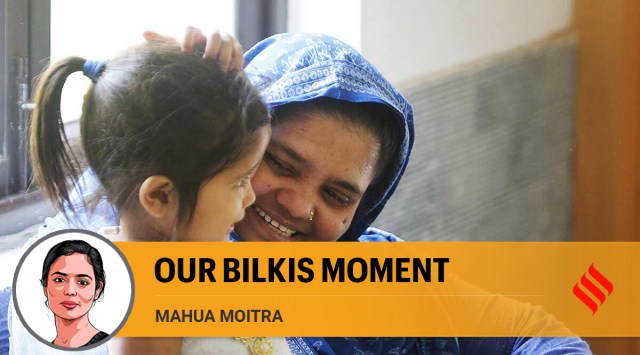
The visuals of Bilkis Bano’s rapists and the murderers of her family being garlanded are fresh for all to see. The Union government’s silence is deafening. This nation is being drip fed via the BJP’s insidious propaganda system that the state of Gujarat had nothing to do with the release of these 11 convicted men, now being celebrated as heroes, as Bilkis’s husband painfully puts it, and that it acted on the Supreme Court’s direction. In fact, the court only noted the applicable remission policy, which allows for remission of the sentences of convicts who have spent 14 years in jail. It did not compel the release of the convicts. The decision to free the rapists and killers — instead of letting them remain in jail, as the policy allows — was entirely that of the government.
How, then, in a country where average pendencies are upwards of 14 years, where undertrials serve years in prison without being charge-sheeted, where convicts with crimes far less heinous than that of the 11 in the Bilkis Bano case serve 30-40 years of life terms without being considered for remission, did these men walk free?
The answer, simply, lies in method.
It has taken a special blend of the right-wing’s hatred for Muslims, its visceral disregard for women as equals, its absolute belief that the law is fundamentally an ass, and its desire to reap electoral benefits from every situation, no matter how unfortunate, that has reprised Polonius’s dictum: Though this be evil, yet there is method in it.
This method is what led to the BJP using the order of the Supreme Court as a smokescreen to aver that the court had somehow compelled the remission.
The remission of a sentence is an exclusively executive prerogative. The Supreme Court as far back as in State of Madhya Pradesh v. Ratan Singh (1976) 3 SCC 470, settled this debate by clarifying that pardon, remission and commutation are within the exclusive domain of executive decision-making. It is not our judiciary that has let us down, but rather the executive machinery — the BJP government of Gujarat — which has commuted the punishment awarded to these rapists and murderers.
The other manifestation of the method in evil was the government’s malevolence in applying its 1992 remission policy. Its updated 2014 policy explicitly lists gang-rape and murder as offences for which remission is impermissible, but this does not mean a request for early release made by rapists and murderers under the 1992 policy has to be granted. Moreover, Section 435 of the CrPC clearly states that in cases investigated by agencies governed by the Delhi Special Police Establishment Act, the states have to act in consultation with the Union government. Bilkis’s tormentors were convicted by a CBI court — where, then, is the evidence that the government of Gujarat consulted the Centre on remission in this case? Established case law in D Krishna Kumar vs State of Telangana had the high court lay down that the appropriate authority deciding a remission should consider the opinion of the presiding judge of the court before or by which the conviction was had or confirmed. The government has said nothing about this so far.
Half of the panel that decided on the remission was directly linked to the BJP. Two were BJP legislators. One was a BJP office-bearer, and one a former office-bearer of the local BJP. The others — the district collector, superintendent of police and jail superintendent — report directly to the state government. The method is clear.
As with all heinous crimes, it is most often the spectators who play a more defining role than even the perpetrators. Indians today risk being reduced to collective participants in the crime against Bilkis, in the murder of her child and in the decimation of the members of her family. For each one of us who engages in the whataboutery of placing the crimes of these 11 men in a make-believe moral spectrum of bad, worse and worst must remember this: It doesn’t get any worse than this.
To have gang-rapists, the killers of a 3-year-old walk out of jail and be feted with a hero’s welcome with the active connivance of an entire establishment requires a very special kind of evil. But for every BJP voice that lauds this “sanskar”, there exists a Kali, waiting in the wings, tongue out and foot raised, who will fight back. Like the young woman gang-raped in Delhi 2012, who even in death strengthened the moral fibre of India, Bilkis even in shocked silence will spur us to action.
The writer is a Trinamool Congress MP